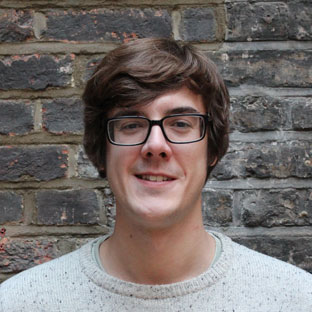This is a network:
It's not a very interconnected network yet, but it's a snapshot of the 100 remarkable people who we will be working with over the next year, and the relationships that connected them at the start of the Diaspora ChangeMakers programme. [Read more below].
This will change over the next year, as the ChangeMakers in this network work together to develop their leadership skills, contribute to each other's projects for social change, and collaborate with each other on this website and in a series of face-to-face networking events facilitated by the RSA.
The first of these events took place on Monday (28th April) at the RSA House in London, where most of the ChangeMakers had the opportunity to meet each other for the first time. For me, the event was a real privilege to be present at, and really exciting after many months of recruiting, researching and waiting. As my colleague Gaia Marcus said on the day, up until now the Diaspora ChangeMakers had been a lot of data in file of 1,000 applicants to the programme, and it was so good to finally put names to faces for the 100 in the core network.
On Monday, as well as participating in a round of 'speed networking' activities, many of the ChangeMakers took to the stage to tell other people about what social action projects they were working on and how others could get involved. These projects were hugely diverse, imaginative and important: in a week in which the world worries about the fate of the 230 schoolgirls abducted in Nigeria, Betty Makoni told the group about her work which encourages us to see young girls as people that need special attention paid to them because they are 'complicated people' whose experience is shaped by the fact of their being both female and young, thus adding another key facet to feminist and development thought. As the world remembers the 100th anniversary of the First World War, Peninah Achieng spoke about the involvement of African soldiers in that war who fought in colonial armies, and asked the other ChangeMakers to help put her in touch with people who knew African soldiers so that she can speak to them as part of her research project (at least four people came forward with relevant information for her). And Danmore Sitole intoduced his project which seeks to combat stereotypes of HIV/AIDS and support HIV+ people in the employment market.
But I already knew that the Diaspora ChangeMakers were working on incredible pieces of work – this is what makes them ChangeMakers in the first place, and I have read everybody's application forms and spoken to many of them on the phone about their projects. Speaking personally, what was really special about Monday's event was the way the ChangeMakers were able to inspire the other people in the room, the way that everybody was so interested and excited by other people's work, and how they were already making links and talking about how they can collaborate and support each other in the future.
As one attendee put it, 'I'm hearing about so many new areas of work that I've never thought about before, but we're all creative and skilled people and it's important we think outside of our boxes and think about how we can contribute to each other's work'.
We'll spend the next few months observing and facilitating that process.
Photograph by Sam Thomas. Network diagram by Gaia Marcus.



Join the discussion
Comments
Please login to post a comment or reply
Don't have an account? Click here to register.
I came back yesterday, after a week end in London, after our wonderful four courses days... I came back and remembered about this poetry: "Happy he who like Ulysses has returned successful from his travels"...
I came back when everyone, the medias, were still speak and question about the so called successfully the so called extremists politic parties and their leaders such as the one in France... The elections, the European elections, are a real Tsunami...
But, I read again my notes and my book "Cultural Intelligence"... and it helps me to understand what happened and how it happened and then our responsibility as change makers.
In fact, the 30 per cent who voted in Europe are more then 50; very few young voted. I questioned most of my friend, none of them went voting. Or, those who are on their fifty do have a very high and large core; their flex is very small. The leaders "extremists" (who do not represent Europeans opinions) use such core that became a real good soil garden for their narrative...
We spent real nice times and we learned... now, let's work...
Norbert